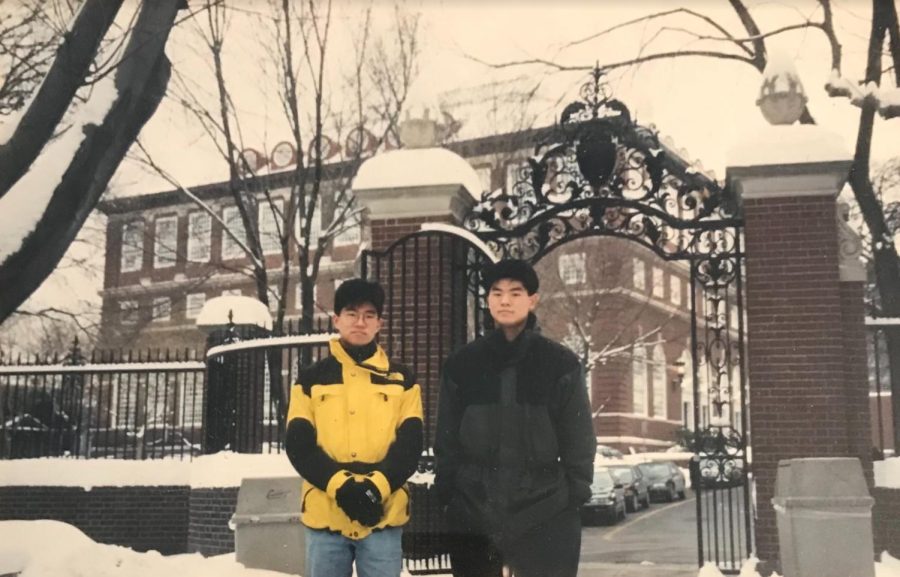An interview with college alumni interviewers
From right to left: Mr. Kim and his brother, both Harvard graduates.
Philip Kim, Harvard class of 1998, has been conducting interviews for over 10 years.
Although the interview process may seem complex and winding, Mr. Kim simplifies the role of the interviewer into two primary parts:
Being a voice for the applicant – adding more color to their overall application by emphasizing aspects of the applicant’s interests and achievements not fully expressed in short answers or essays. Sharing their personal experience and answering questions about the school to the extent that is helpful to the applicant.
To Mr. Kim, the main purpose of the interview is to strengthen the students’ application by digging deeper into their interests, hobbies, and passions.
Each interview takes anywhere between 45 minutes and one hour; a limited amount of time to get to know the applicant in depth. Since there is not enough time for the applicant to highlight all of their achievements, Mr. Kim suggests that applicants focus on one or two passions and interests.
“There is a story in each and every one of those interests, but maybe there’s a stronger story in another,” Mr. Kim said.
“We all try to do a lot of things, but there is not enough time to do everything. It is important to focus on a few things that give more insight into who you are,” Mr. Kim explained.
As for Mr. Kim, he views conducting interviews as a way to get involved with his alma mater. The Harvard graduate recalls his own interview, in which he described his passion for violin, among other interests, as well as his hobbies.
Getting to learn about applicants’ unique achievements is inspiring to Mr. Kim, and he considers it a privilege to be a part of their journey to college.
As a part of the admissions process, diversity is extremely important to Mr. Kim. He emphasizes that Harvard is looking for someone that brings something to the student body, and vice versa. “It’s a two way street,” Mr. Kim added.
What does the perfect student look like? “No one is perfect,” Mr. Kim clarified. “As I like to say, there is imperfection in perfection. There’s no such thing as the ideal student; it’s about the individual,” Mr. Kim continued. The Harvard interviewer believes that the most important aspect of the interview is to express your true self.
Mr. Kim advises applicants not to do themselves a disservice and portray themselves as someone else – someone who they think will be liked more by colleges.
“Stay true to yourself; only that way will you find the school that best suits you,” Mr. Kim emphasized.
As college acceptance rates plummet, students’ anxiety skyrocket just to apply to the school of their choice. Many students work hard to be the perfect well rounded student with zero flaws, just to barely make the college cut. Although there are many factors colleges consider in a student a few colleges still stick with alumni interviews. Students meet with alumni of the college and hope their answers fit the bill. Dr. Duke Pao, Dartmouth Alumni, worked in the interviewing process for Dartmouth.
Dr. Pao participated as an interviewer, as well as a district enrollment director. “I did assign interviews to the alumni interviewers.” Reveals Pao. But for the alumni interviewers, responsibility was to receive the assignment of the applicant.” Pao, admitted in past years, when assigning interviewers and interviewees, he did not have much information on either. However, in recent years, the process has evolved. “They had the applicant’s interests, academic interests, and what they wanted to major in. Also the interviewers gave their interests and that is what they would use to match up.” Pao clarifies.
Most students want the truth on what colleges really want and can never receive a clear answer. Pao revealed, “They asked about academic intellectual curiosity, which is one thing they look for, they look for finding extracurricular activities. They also look for character in a person.” Pao states. Pao also talks about the colleges looking for if students’ personalities deem fit for the specific college. Specifically for Dartmouth, “They want to make sure that you understand Dartmouth is a small college, kind of in the middle of nowhere in New Hampshire, to make sure they think you would fit in.” Pao explains.
Nevertheless, there are always red flags to watch out for. Pao expresses that every alumni interviewer views red flags differently. Dr. Pao believes academic engagement rates are of higher importance than other topics. “So what I mean by that is I specifically remember asking a student about what they read and any favorite novels. They basically said that they don’t like to read, which in itself is not very good.” Pao expresses. Pao insists answering questions to the best of your ability with some insight helps avoid red flags for almost any interviewer.
The question of what college interviewers proceed with after an interview seems to haunt students. Most students stress about the interview, while interviewers evaluate and rate their experience during the interview. “The four different aspects on the evaluation are academics, extracurricular, character, and do they fit into the college.” Pao reveals. The interviewer fills out their opinion of each aspect relating to the student. Lastly, the interviewer rates the student on a scale of one to five. “That is definitely the worst or least desirable part of the interview process.” Pao explains.
As the seniors soon leave the horror of college applications, juniors anxiously wait to begin the long menial process. Most prestigious colleges interview students, for example Brown, Yale, Harvard, Cornell, UPenn, Princeton, and Columbia. As a piece of advice, Dr. Pao states, “ It really comes down to that the interviewer can only help and it’s your time to put your best foot forward.”



